Pernille Ripp's Blog, page 30
May 26, 2018
Parents – How to Create Great Summer Reading Experiences for All
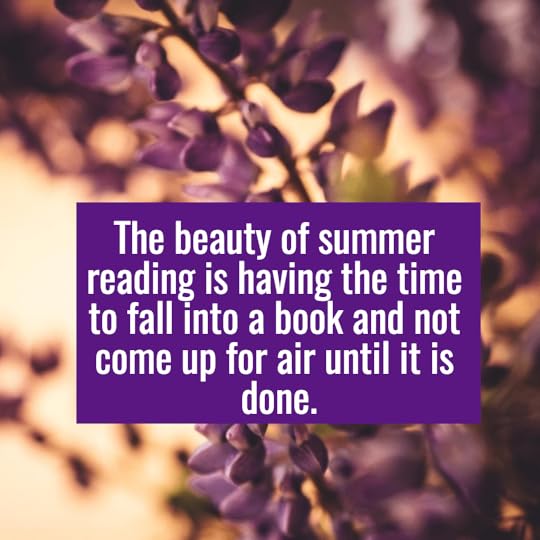
I know many of us educators (and those at home) have been working hard all year to try to cultivate or protect a love of reading in our learners. Now with warmer temperatures and summer beckoning for the Northern Hemisphere comes the real test; will kids keep reading over the summer? Is what we did enough? Did we lay enough of a foundation, get them excited, get them hooked so that the next few weeks or months will not put them in a reading drought? While time will truly be the judge of how the work might pay off, here are a few ideas that may help depending on the age of the learner.
Have a to-be-read list. All year we have cultivated ours, trying to add as many titles as possible so that when the students leave our classrooms they have something to help guide them when they are either at the library or at the bookstore. This is especially important for our “fragile” readers, those who have just discovered that books and reading may be for them after all and need a constant diet of amazing books. But really all kids should have one, not just some. I just had students send home an email with their to-be-read list or create a Goodreads account, so reach out and ask your learner’s teacher to see if they have one made. Even if the school has not created a to-be-read list it is not too late to make one! Browse the displays at the library or at the bookstore and write it down somehow. Keep the list on you because you never know when you come across an opportunity to find more books.
Visit places where books are present. We go to the library a lot; when it is too hot and the pool is not open, when it is stormy, when we are tired. We also go to our local bookstore and browse. Accessing book, touching books, getting excited about books and anything that we can read is vital to keep the desire alive. Sign up for the public library’s reading challenge or make it a routine every week to go and get new books. Spend a few hours reading while you are there. If there is no library or the library is not accessible to you, reach out to your learner’s school, is there a way they can lend you books? Our school library does a summer checkout before the end of the year, as do I. If you are not able to go places where there are books, ask your child’s teacher if you may borrow a big stack of books from them if you promise to bring them back. I have often lent books to families over the summer as a way to help them keep reading.
Make it social. I love reading a great book and then talking to others about the book or even better passing the book on to them. Make reading a social aspect of your summer; have reading “parties” where kids can discuss books, create a book swap with other families, scour garage sales for long-lost favorites. Offer up yourself to read with your learner or get more than one copy of a book (if you have access to them) so that others may join in the reading. Too often as parents we think we should read all of the books our child is reading and while that can be a fun bonding experience, it may be more powerful if you can get a friend of your child to be a reading partner.
Read aloud. Many parents assume that their older kids do not want to be read aloud to, and yet, my students tell us repeatedly how much they miss it. So why not find a great book and take some time to experience the book together?
Use audio books. I love that I can borrow audio books from our library – both Harry Potter and the Lightning Thief series has captured our imagination for months. When your children are in the car, put on an audio book. Have a copy of the book ready if anyone wants to keep reading and you have reached your destination. With all of the research coming out correlating audio books with further reading success this is a winning situation.
Find great books. Get connected online to communities like #Titletalk, #BookADay, #WeNeedDiverseBooks, or Nerdy Book Club to get ideas of what to read next. I am constantly adding to my wish list due to these places. Use the professionals like librarians, booksellers and teachers. Also, ask other parents what their kids are reading, create a Facebook page to share recommendations or simply use you own page, anything to find out what great books are available.
Create a routine. We read every night and sometimes even in the morning (as well as throughout the day but then again we may be slightly book obsessed). Helping your child create a routine where reading is a natural part of the day mean that they will create ownership over the habit, thus (hopefully) inspiring further reading. I encourage my students to read first thing in the morning before they get up or as the last thing they do before falling asleep. Whatever the routine may be, sit down and read yourself, it is vital for all of our children to see their parents/caregivers as readers.
Allow real choice. I have seen some parents (and schools) require learners to read certain books over summer, but summer is meant to be guilt-free reading. Where we reach for those books we cannot wait to read because they will suck us right in, where we fill up our reserves so we can perhaps finally tackle that really challenging book that we have been wanting to read. Where we explore new books because we want to. Too often rules and expectations infringe on the beauty of summer reading; falling into a book’s pages and not having to come up for air until it is done. That also goes for reading things that may be “too easy” or “too hard” – I devour picture books, graphic novels and all thing “too easy” in the summer, as well as trashy beach reads and Danish crime mysteries. I refuse to feel guilty about my choices in reading, because that is never what reading is about.
Have books everywhere. Again, this depends on how many books you have access to, but leave books wherever your kids go. I have books in the car, in their rooms, in the kitchen, living room, etc. That way the books seem to fall into their hands at random times; stopped in traffic, quiet time before lunch, a sneak read before falling asleep. It is a luxury to have books in our house and so we try to make them as visible as possible.
Celebrate abandonment, but ask questions. When a child abandons a book, this is a great thing. They are learning that this book is not for them and they can use their energy for a book that will be for them. But ask questions so that they may think about what type of book they might like. So they can think about what type of reader they are and want to be. Make sure that there are other books they want to read as well so that they can keep trying to find great books.
Explore new books together. Summer can be a great time to try to push your own habits of reading, as long as it doesn’t feel like a chore. Set a reading challenge, compete against each other if you want, challenge each other to read each other’s favorite books and revel in the shared experience.
Be invested and interested. This does not mean that you ask your child to write reports about what they read, in fact, I would be very careful as to what type of work goes along with reading over the summer beside reading, but do ask questions. Ask whether they enjoy the book or not. What they plan on reading next. Read along with them or beside them. Make reading a part of your life so it can become a part of theirs.
Keep it fun. Too often, especially if our child is not a well-developed reader, we can get rather nervous as parents and think that we must keep them on a regimented reading program at all costs. That we must have them write about reading or track it somehow. Have them read, yes, but keep it light and fun. The last thing we want to do is to make reading a worse experience for them or adding more stress to your family.
What other ideas do you have?
If you like what you read here, consider reading my newest book, Passionate Readers – The Art of Reaching and Engaging Every Child. This book focuses on the five keys we can implement into any reading community to strengthen student reading experiences, even within the 45 minute English block. If you are looking for solutions and ideas for how to re-engage all of your students consider reading my very first book Passionate Learners – How to Engage and Empower Your Students. Also, if you are wondering where I will be in the coming year or would like to have me speak, please see this page.
May 22, 2018
On Reading Rewards
He finally found a book he liked.
She actually has a book she wants to read over summer.
He read more books than he ever has before.
She tried a new genre and liked it.
He finally actually read a book rather than just pretend.
These major accomplishments are some that my students shared today as we gathered around to do our end of year reading celebration.
Some of my students read more than fifty books this year, some only read a few. And yet, within that number lies the story of a child who tried, who didn’t give up, who kept investing themselves as a reader, no matter what their relationship was before they came to 7th grade. I am so proud of how they have grown.
And yet, when I look around on social media I keep seeing posts about how teachers are throwing special celebrations only for the kids that met their 40 book challenge goal. That met their AR level. That reached the growth target set for them. And I cannot help but get sad, and perhaps, a little angry, because are we truly thinking about what these types of celebrations do to the kids that once again are excluded? That once again did not get invited? That once again did not get any recognition no matter how hard they worked?
Once again it appears our well-meaning intentions have gotten the better of us. That we get so focused on the goal, on the quantity, that we forget about the growth. The incredible mountains that some of our students have overcome to simply find a book, read a book, love a book.
When we reward only those who have met the goal we have set, we tell the rest that while they tried, it was not enough. That while they may have finally read a book, they are still not enough of a reader for us to recognize. That our experience together was never about their growth but was about this arbitrary number that they needed to reach, this goal they did not set. That while they may have felt like they accomplished something, they really didn’t.
Which teacher really wants students to think that?
What if we instead celebrated all of our kids? What if we instead asked every single child to reflect on how they have grown as a reader? What if we instead asked every single child to give themselves an award based on their own perceived accomplishment?
You might get something like this if you did…
[image error]
Kids who know they have grown as a reader and who see the worth in what they have done. Kids who see that the teachers recognize this year’s worth of work and dedication and are so proud of them. Because we are. Kids who are proud of themselves, because they should be.
So I implore you, do not make your end of year reading celebrations about the number. Instead, ask the students what they are proud of. What they have achieved and celebrate them all. Let them have the time to see how far they have come so that they can leave our schools with a sense of accomplishment that they might not otherwise have had.
PS: Next year, start the year by having students set their own goals, as explained here, so that they too can work on something meaningful.
If you like what you read here, consider reading my newest book, Passionate Readers – The Art of Reaching and Engaging Every Child. This book focuses on the five keys we can implement into any reading community to strengthen student reading experiences, even within the 45 minute English block. If you are looking for solutions and ideas for how to re-engage all of your students consider reading my very first book Passionate Learners – How to Engage and Empower Your Students. Also, if you are wondering where I will be in the coming year or would like to have me speak, please see this page.
Best Book of the Year Speech in Just 15 Words
Every year our very last speech is a “Best Book of the Year” Speech. Every year, my students declare their love for books in front of the class. They share their favorite reads in order for everyone else to add them to their to-be-read list. I scribble down each title so I can create a blog post for the rest of the world. It is always fascinating to see the books that make the cut.
This year, we have worked on brevity. On the importance of words. On getting to the point, so we added a twist to this yearly event; you get 15 words exactly. No more, no less. 15 words to make others write down the title you loved. 15 words to somehow give enough of a glimpse into the book to tempt others.
To inspire my students I read them a Cozy Classic – a 12-word re-telling of some very well-known classics. Then I have them two days to create their speech, work on their gestures, and prepare for their performance. The results yesterday were pretty stellar. Engaged students and lots of titles added. Lots of laughs while sharing the love of books we have read. One more step toward creating reading experiences long after they leave us. Long after the last day of school.
If you like what you read here, consider reading my newest book, Passionate Readers – The Art of Reaching and Engaging Every Child. This book focuses on the five keys we can implement into any reading community to strengthen student reading experiences, even within the 45 minute English block. If you are looking for solutions and ideas for how to re-engage all of your students consider reading my very first book Passionate Learners – How to Engage and Empower Your Students. Also, if you are wondering where I will be in the coming year or would like to have me speak, please see this page.
May 19, 2018
On Summer Checkouts
We started speaking about the summer slide at the beginning of the year. How this year’s mission was for somehow to keep students wanting to read even when no one was around to hold them accountable. Even when no one said they should. For some of my students, this was no big deal. They already read all of the time on their own accord and could not possibly imagine not reading. And then there were the others, those that smirked a little, possibly even rolled their eyes. Summer and reading, yeah right?!
And yet…as I have read their reading memoirs and asked them for their plans, I have seen the change. As I have asked them what they plan on reading, a few more have risen to the occasion, have told me that when they travel. When they sit by the pool. When they have nothing to do. Perhaps, just perhaps, they will read a book.
But….
For them to read a book, they need a book. It is too easy for us to assume that all of our students have great books in their homes already. It is too easy for us to assume that all of our students will be able to get to the library. It is too easy for us to assume that all of our students have money to pay for books and can get to a bookstore. But the truth is, that many of our students do not have great books at home, do not have the means to get to a library, or do not have the means to purchase books. But we can help that.
First, we have to start thinking about the fines we place on children when they lose a book. While I get that books are expensive and that we need some sort of accountability, we know that fines and fees can become the very obstacle that keeps our most vulnerable readers out of the library. So is there a way for a family to dig their way out of the fines? Can they do something else than pay money to have their accounts cleared? Can we value readers more than books? I lose books every year, it is what it is, and I rest easy thinking of Nancie Atwell’s wisdom, that if we do not lose some books every year, our books are not good enough.
We also need to partner with our public library. After all, a great presentation from a passionate librarian can make a huge difference. They can tell the kids about all of the cool programs happening at the local library, book talk books, and bring in public library card applications for those kids that don’t have one.
Our school library can do a summer check out. We are so lucky at our school that our librarians do just that. Students can check out up to ten titles over the summer with parent permission. All they do is fill out this permission form and then they come on the 29th of May and bookshop. I have also heard of school libraries having summer hours or even summer bookmobiles that travel to the neighborhoods of our students. Since they are not in our schools, why not bring the books to them?
We can open our own bookshelves. There is very little reason for all of our books to sit and collect dust throughout summer. So why not open up your classroom library as well? For some of my kids getting parent permission will be a near impossibility, so I do not require it. Our summer checkouts started yesterday, equipped with their to-be-read list, students get to grab a stack of books to bring home over the summer. I have a simple spreadsheet where I write down the child’s name and every book they grab and then have a column for whether they returned it or not. My students have been working on their to-be-read lists all year, now is the time to put it to work! I tell students they can bring them back over the summer by dropping them off at our office or bring them back on locker drop off or when 8th grade starts again. Sure, I lose a few books every year doing this but it is worth every single page read!
[image error]
And finally, we can hand them a book. The last month or so, I have been scouring stores to amass 150 books that our students can select from on the very last day of school. By using places like Books4School and Scholastic, we have an amazing selection of drop everything and read books that hopefully will entice our students to read. This is our way of telling them thank you, of giving them another chance to read this summer, of thanking them for a great year together.
All those books we so lovingly pull together for our students deserve to be continually placed in their hands. Let’s keep the children reading this summer, one book at a time.
If you like what you read here, consider reading my newest book, Passionate Readers – The Art of Reaching and Engaging Every Child. This book focuses on the five keys we can implement into any reading community to strengthen student reading experiences, even within the 45 minute English block. If you are looking for solutions and ideas for how to re-engage all of your students consider reading my very first book Passionate Learners – How to Engage and Empower Your Students. Also, if you are wondering where I will be in the coming year or would like to have me speak, please see this page.
May 16, 2018
What We Could Have Done, Perhaps
I am not sure why I am writing this. Perhaps it is simply to get it out of my brain, if even for a few minutes, perhaps it is to not feel so alone. Perhaps it is because someone, somewhere, out there will have some sort of magical answer that will somehow make all of this better.
The very harsh reality that we now face as a family is that our oldest daughter started this school year as a fairly well-adjusted eight-year-old who liked school, was nervous about making friends as the new kid, but was known as being kind, helpful and as a hard worker despite the obstacles she faced.
And then the school year happened. And the bullying happened. And life seemingly turned upside down from what we knew or at the very least thought we knew.
We now end the year with a kid who is angry a lot, sad a lot, who hates school, begs us not to send her, and worries that she will never be liked by her peers. Who snaps for little reason, has insomnia, and has continued to face learning obstacles that we have not been able to address because her mental health comes first before we think about reading intervention.
We now end the year with a kid that can go from being happy one moment to completely devasted the next. Who yells so much, I sometimes forget what it sounds like to have a normal conversation with her. Who asks for our protection and we know there is only so much we can do. And yes, we have her seeing someone both in and out of school, but it does not seem to be enough. Nothing seems to be enough.
While the rational part of me knows that there is not much more we could have done to protect her, I cannot help but feel like we did this somehow. Like we somehow failed to equip her with the tools she needed to survive this school year. That perhaps if we had raised our voices sooner. If we had yelled louder. If we had seen the signs. If we had taught her how to change her personality. If we had not moved to our new house. If we had not switched schools. If only…
If only…
As parents, we pick up the pieces of our children every day. We marvel at times over the miracles they are, over how they grow. Over how they seemingly become this incredible person we always knew they would be.
But sometimes the pieces seem to no longer fit. We wonder where this child came from and how we need to parent now. We love, even when they yell. We hug, even when they say they don’t need it. And we keep telling them that they are beautiful. That they are smart. That they have worth. Even when they don’t believe us because the words of other children now speak louder than whatever we could say.
This year, we count down the days until school’s out in this house, something we have never done. (17 days tomorrow). We tell her just one more day, tell your teacher if you need to, look for a friend, hold your head up high. And we hold our breath for the bus to bring her home, waiting to see what will be unleashed as she walks through our door.
I can’t help but think of how I somehow failed as a parent. Failed to protect. Failed to guard. Failed to fix. But perhaps it was never that simple?
May 14, 2018
Who I Am as a Reader – A Reading Memoir Writing Project

Every year, we have tried to create a meaningful end to the year. A meaningful way for all of us to come together one last time, to cement the year we have had. To realize just how far we have come. In the past few years, it was our This I Believe speeches, given on the last few days where students sometimes decided to delve into their past as they looked at their future.
This year, I wanted something different and an idea I have heard both Donalyn Miller and Teri Lesene mention came to mind; the reader memoir. A seemingly simple narrative that would allow us to see the growth of our students as writers while they reflected upon their reading. A way for us to hear the truth that they carry within them, to see the hopes or fears they have for their future reading life.
So three weeks ago, as we started our final reading challenge (a self-selected book club or an independent reading challenge), I unveiled the project, to see the slides, go here. Write about your life as a reader. The good, the bad, the future, the past. Tell me about who you are now, how you have grown, the books you have cherished and those you didn’t. About what made you a reader or turned you away from reading.
At first, some kids were skeptical, after all, why would they want to write about that, and yet as the memoirs themselves start to roll in, I cannot help but sit in awe as my students dive into their own reading experiences to share who they are as readers now.
“If we lived in a world without books, I’d make my own…”
“When we’re asked to read in class, I actually read.”
“I don’t think I was meant to be a reader.”
“My parents would sit with me and my siblings, reading us stories, and we would huddle close and listen. Then I would begin to slump, falling asleep to the flowing words.”
As my students’ words surround me, I cannot help but be grateful for the words they have chosen to share, the truths they have given me as I prepare for another set of readers and nonreaders next year. What a way to end, by knowing them even more. What a way for them to end, by knowing themselves a little more. Perhaps, this will be something they also remember.
If you like what you read here, consider reading my newest book, Passionate Readers – The Art of Reaching and Engaging Every Child. This book focuses on the five keys we can implement into any reading community to strengthen student reading experiences, even within the 45 minute English block. If you are looking for solutions and ideas for how to re-engage all of your students consider reading my very first book Passionate Learners – How to Engage and Empower Your Students. Also, if you are wondering where I will be in the coming year or would like to have me speak, please see this page.
May 13, 2018
On the Road Again
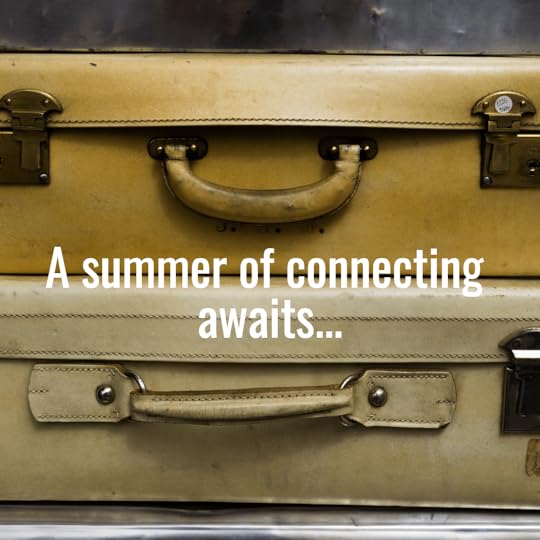
As summer beckons in just a few weeks, I have the honor of traveling to learn and teach with passionate educators around the country. I often get asked where I will be, and while this page is almost always up to date, I thought it would be nice to have a visual of where I will be this summer in case I am close to where you are, especially since most of these are open to the public. If you would like to have me come to your event, please see this page, it is not too late to book for the summer. I hope our paths cross!
May:
May 19th, Morning workshop, Passionate Readers, Waukesha, WI
June:
June 9th, 2018 – Speaker, Indiana State Book Festival, Muncie, IN
June 21st, 2018 – Scholastic Reading Summit, Chicago, IL
June 24th – 26th, 2018 – ISTE, Chicago, IL
June 28th – July 4th, 2018 – Barcelona, Spain
July:
July 9th – 10th, 2018 – NerdCamp, Parma, MI
July 12th, 2018 – Scholastic Reading Summit, Raleigh/Durham, NC
July 17th, 2018 – Scholastic Reading Summit, Los Angeles, CA
July 21st – 28th, 2018 – Hanging out around Carolina Beach, NC
August:
August 2nd, 2018 – Workshop, RRVEC, Grand Forks, ND
August 8th, 2018 – Workshop, WSRA, Stevens Point, WI
August 14th, 2018 – Goosecreek, Texas
August 15th, 2018 – League City, Texas
August 24th, 2018 – District PD, Calexico, CA
May 12, 2018
How to Really Thank a Teacher
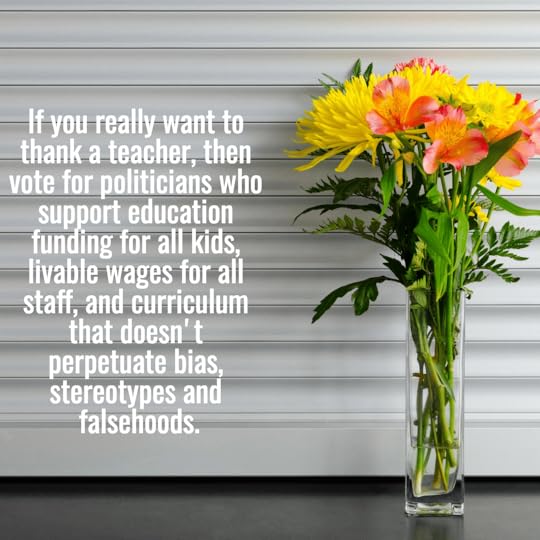
The cookies have been put away. The flowers beginning to wilt. The cards remain on our whiteboards, but life has moved on. No more lunches. No more notes. No more half-price pizza or buy one get one free burritos. Teacher appreciation week is over and the world keeps on spinning.
And while I appreciate the sentiment. While I appreciate the notes. The cards. The food, I cannot help but thank that it is too easy to thank a teacher this way, rather than do it properly. That the whole notion of teacher appreciation is just one more example of how the teaching profession is given little value, in certain circles, because if it were, we wouldn’t need to be thanked like this.
What if instead of a note, people voted for politicians who believed in funding public schools? For politicians who believe that better teaching programs are the answer, not equipping people with no teaching degrees a teaching license? For school boards who support the courageous work teachers do in their classrooms as they try to teach empathy, kindness, acceptance, and understanding?
What if instead of flowers, we were all given livable wages and healthcare that was affordable? I work for a district that has kept our wages intact despite the push of our politicians, who have made it their mission to not only attract new teachers but retain the old. What if every teacher felt that respect? What if every teacher could actually pursue their dream of making a difference for the future of this nation, without having to work two jobs?
What if instead of lunch, we were all given resources? Student service personnel so that every child could get the support they need? Interventionist so that all kids can achieve? Classroom libraries in every room? Technology devices to keep up with the demands of an ever-changing world? Textbooks, if needed, that accurately portray the world we live rather than continue to push misogynistic, racist, and other dismantling views?
What if instead of discounts, we were all given support? Support from our administrators to show off our family, even when it falls outside of what some in society has deemed “the norm?” Support from our school board when we share books that start much-needed conversations? Support for when we try new things? SUpport for when we support our students who need it so desperately? Support for when we hang on to common sense instruction? Support for when we question the computer programs that are placed in our schools instead of teachers? Support from our families as we try to create opportunities that do not push an agenda, but instead push understanding, critical thinking, and actual debate.
To be a teacher is a calling for most. To be a great teacher is a job that will tear your heart out, fill it up and place it back in a new shape. While I will hang on to the notes and cards my students gave me this week until I get old and can no longer teach, I wish we could see as a society how there is so much more to be done. How teachers should feel valued all of the time. How we need to protect the work they do. The meager resources they get. The little respect at times individual teachers face. Not just when the calendar tells us so.
May 10, 2018
And What Do We End With?
A few days left of school, counting in days instead of weeks, counting in hours rather than units and you can hear the whispers in the corners.
“We will miss these kids…”
“Another great year…”
“They are ready…”
And we mean it as we plan our lessons, down to the very last day, and we try to continue the learning despite the energy, despite the crazy, despite the hint of summer in the air.
And we think of how far we have come, how much they have grown, how much we have grown, and we remember that what they will remember will probably not be the lessons we so meticulously planned. The grades they got. The homework they did. But the moments. The feeling. The little things that in the end became the big.
How we stood outside our doors greeting them every day.
How we smiled whenever we saw them.
How we asked what was the matter rather than assumed we knew.
How we asked others how we could be better and actually listened rather than felt judged.
How we took a moment when they needed a moment and how it paid off in the end.
How we told them we were glad they were here rather than tell them they were late.
How we tried to make it matter.
How we tried to make it meaningful.
How we asked them what we could do better and then actually did it.
How no matter the day, no matter our mood, our classrooms and our school was always ready for the child who showed up because that is the child we hoped would come.
[image error]This sign has greeted anyone who enters our room this year. It will stay up next year.
And we vow to keep trying to reach that child that we haven’t quite reached until the very last day, until the very last moment.
We start our years with our hopes and our dreams. Our hearts ready to love. With worry and sometimes doubt that we can be what they need us to be. We start our years with lofty goals and new ideas, ready to make a difference.
And what do we end with?
A year filled with moments that shape us in ways we cannot even comprehend yet.
A year packed with learning that will only help us be better.
A year of opportunities to be something more than we started us. A year that hopefully taught us as much as we taught them – if we did it right.
And hearts that now hold the names of even more children who went from perfect strangers to be ours. Our kids. Our kids who we will miss even though they may forget our names. Even though they may forget our lessons. Even though they cannot wait for summer and are even counting down the days.
Who knew we had so much room to love?
Who knew we would be, already, to do it all over again?
If you like what you read here, consider reading my newest book, Passionate Readers – The Art of Reaching and Engaging Every Child. This book focuses on the five keys we can implement into any reading community to strengthen student reading experiences, even within the 45 minute English block. If you are looking for solutions and ideas for how to re-engage all of your students consider reading my very first book Passionate Learners – How to Engage and Empower Your Students. Also, if you are wondering where I will be in the coming year or would like to have me speak, please see this page.
May 5, 2018
Need Some Inspiration? Enter to Win a Bundle of Books.
With the days hurriedly passing by, it is hard to believe that in the northern hemisphere school is almost done for many. I am going to miss my students so much. Days of eating ice cream, sitting by the pool, and yes, traveling to speak and learn from others are ahead and my stack of amazing professional development books awaits. I love summer for the renewal and recharge it gives us.
So why not share the love a little? I thought it would be fun to give away a bundle – yes, all four books to one person – of professional development books that can hopefully spark some conversation and help you shape your teaching different. This contest is open to the world and all you have to do is enter on the form. It will close on May 10th.
What are the books?
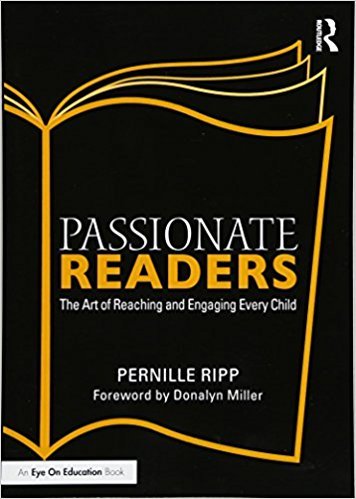
I am so happy that so many are finding inspiration within the pages of my latest book, Passionate Readers. The lessons from my students in it have truly changed the way I teach and think about reading instruction. Hopefully, it will help you do the same as we discuss independent reading, reading identity, libraries, and how to help students actually like reading.
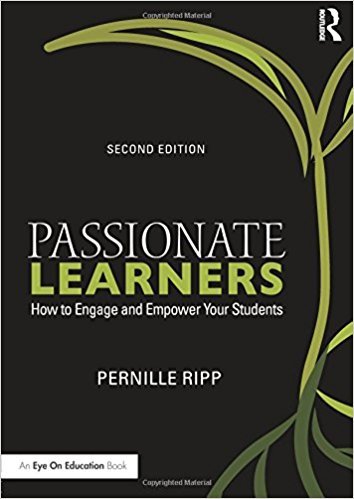
The very first book I wrote, Passionate Learners, is all about how we change our school system from within. Once again, pushed by my students’ lessons and advice, this book is meant to reshape our entire school experience in order to help students find more reason to be engaged in school. From small ideas to big pushes, this book is meant for every teacher, everywhere, that feels school can be better for all of our kids.
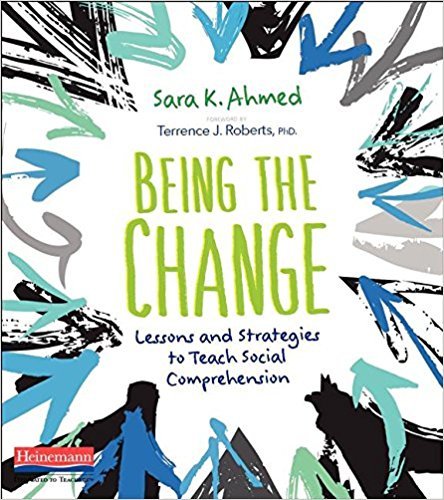
If you follow this blog, you know that I am obsessed with Sara K. Ahmed’s book, Being the Change. This book is reshaping my classroom and should be a must for any educator, no matter their grade level.
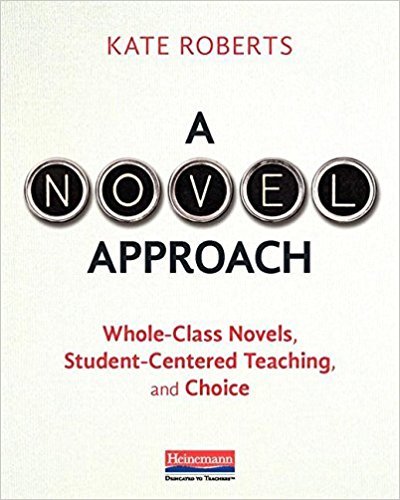
And finally, but not least, Kate Roberts’ newest book, A Novel Approach, is the book we all have waited for. A practical inspiration for how to incorporate a whole class novel into reader’s workshop. Trust me, the ideas in here are not to be missed.
I hope you are as excited about this bundle as I am, after all, any of these books by themselves should help an educator grow and also feel affirmed in the work they are already doing. But together, that is a powerhouse of change. To enter, please fill out the form, please enter only one. Good luck and happy reading!
If you like what you read here, consider reading my newest book, Passionate Readers – The Art of Reaching and Engaging Every Child. This book focuses on the five keys we can implement into any reading community to strengthen student reading experiences, even within the 45 minute English block. If you are looking for solutions and ideas for how to re-engage all of your students consider reading my very first book Passionate Learners – How to Engage and Empower Your Students. Also, if you are wondering where I will be in the coming year or would like to have me speak, please see this page.



